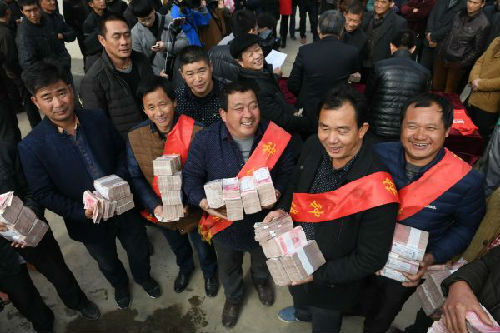According to the survey, the proportion of year-end bonus for white-collar workers in China has rebounded.

Large grain growers in Jiangxi distributed 3.08 million "year-end awards" to farmers. On January 8 th, the "planting champions" took a group photo with bonuses. Xinhua News Agency reporter Zhou Mi photo
Reference message networkReported on January 14th.Foreign media said that a survey found that the impact of slowing economic growth on year-end awards peaked in 2015. In 2016, more white-collar workers in China received year-end awards than in 2015, which was also higher than that in 2014.
According to the Financial Times reported on January 13th, an annual survey revealed that more than half of white-collar employees in China had not received the year-end bonus before the coming (expensive) Lunar New Year holiday.
A survey of 11,500 employees conducted by Zhaopin, an employment agency in China, found that by the end of 2016, 50.9% of employees had not received the year-end bonus. Another 9.6% employees were told that the year-end bonus would be postponed until after the Spring Festival holiday.
Before this slowdown, which began in 2014, employers in China were not so stingy with bonuses. The amount of bonus will be much higher than one month’s salary, so that employees who go home for vacation can have enough cash to buy gifts (or save them as savings) for their elders and other family members.
However, the impact of weak growth on year-end awards may have peaked in 2015. At that time, 66% of white-collar workers did not receive the year-end bonus. The proportion in 2016 was actually better than that in 2014, and the proportion that did not receive the year-end award in that year was 61%.
However, in this rebound, there has also been a decline in the amount of bonuses: last year’s average year-end bonus was 12,821 yuan, about 2,000 yuan more than in 2015, but still less than the average in 2014 in 800 yuan. More than a quarter of the respondents with shrinking bonuses attributed the reason to the poor performance of the company.
The amount of year-end awards varies greatly between different industries and cities. The average year-end bonus of financial institutions is 17,200 yuan, while the year-end bonus of education departments is less than half of this amount, only less than 7,500 yuan.
The gap between the 34 cities surveyed is even greater. The average year-end bonus in Beijing is more than 15,800 yuan, which is three times that of Shenyang, which has the lowest year-end bonus.
Employees of state-owned enterprises expressed higher satisfaction with the year-end award than private enterprises. This is not surprising, because the average year-end bonus of state-owned enterprises is 17,318 yuan, which is about 6,000 yuan higher than the expected year-end bonus of private enterprises.
However, the company’s stinginess in the year-end bonus may not only damage the employees’ Spring Festival holiday, but also turn back and bite their employers: 39% of the respondents said that if the year-end bonus can’t return to normal, they will find another job, which is 2.3 percentage points higher than that in 2015.